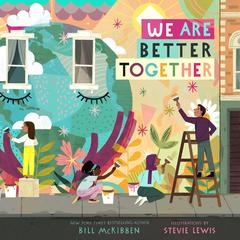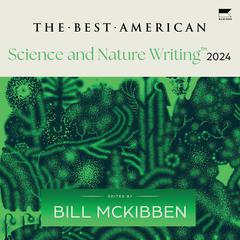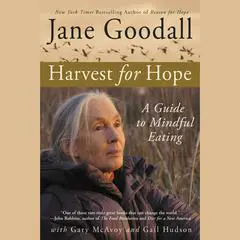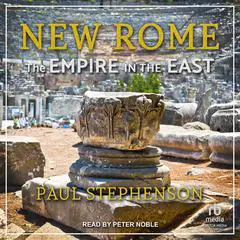 Play Audiobook Sample
Play Audiobook Sample
Eaarth: Making a Life on a Tough New Planet Audiobook
 Play Audiobook Sample
Play Audiobook Sample
Quick Stats About this Audiobook
Total Audiobook Chapters:
Longest Chapter Length:
Shortest Chapter Length:
Average Chapter Length:
Audiobooks by this Author:
Publisher Description
"Read it, please. Straight through to the end. Whatever else you were planning to do next, nothing could be more important." —Barbara Kingsolver Twenty years ago, with The End of Nature, Bill McKibben offered one of the earliest warnings about global warming. Those warnings went mostly unheeded; now, he insists, we need to acknowledge that we've waited too long, and that massive change is not only unavoidable but already under way. Our old familiar globe is suddenly melting, drying, acidifying, flooding, and burning in ways that no human has ever seen. We've created, in very short order, a new planet, still recognizable but fundamentally different. We may as well call it Eaarth. That new planet is filled with new binds and traps. A changing world costs large sums to defend—think of the money that went to repair New Orleans, or the trillions it will take to transform our energy systems. But the endless economic growth that could underwrite such largesse depends on the stable planet we've managed to damage and degrade. We can't rely on old habits any longer. Our hope depends, McKibben argues, on scaling back—on building the kind of societies and economies that can hunker down, concentrate on essentials, and create the type of community (in the neighborhood, but also on the Internet) that will allow us to weather trouble on an unprecedented scale. Change—fundamental change—is our best hope on a planet suddenly and violently out of balance.
Download and start listening now!
"Although this book makes me want to move to Vermont (I hate cold weather, so this was quite the surprise!),raise bees and open a grist mill, I still found myself motivated to make changes to walk a little more lightly on our new eaarth. You probably need to already be a bit of a conscious/guilty consumer to embrace the message, but is a very worthwhile read for those needing more motivation to effect personal changes in energy/consumer habits."
— Francesca (4 out of 5 stars)
Quotes
-
The terrifying premise with which this book begins is that we have, as in the old science fiction films and tales of half a century ago, landed on a harsh and unpredictable planet, all six billion of us. Climate change is already here, but Bill McKibben doesn't stop with the bad news. He tours the best responses that are also already here, and these visions of a practical scientific solution are also sketches of a better, richer, more democratic civil society and everyday life. Eaarth is an astonishingly important book that will knock you down and pick you up.
— Rebecca Solnit, author of A Paradise Built in Hell and Hope in the Dark -
Bill McKibben foresaw ‘the end of nature' very early on, and in this new book he blazes a path to help preserve nature's greatest treasures.
— James E. Hansen, director, NASA Goddard Institute for Space Studies -
Bill McKibben is the most effective environmental activist of our age. Anyone interested in making a difference to our world can learn from him.
— Tim Flannery, author of The Weather Makers and The Eternal Frontier -
With clarity, eloquence, deep knowledge and even deeper compassion for both planet and people, Bill McKibben guides us to the brink of a new, uncharted era. This monumental book, probably his greatest, may restore your faith in the future, with us in it.
— Alan Weisman, author of The World Without Us -
What I have to say about this book is very simple: Read it, please. Straight through to the end. Whatever else you were planning to do next, nothing could be more important.
— Barbara Kingsolver, author of Animal, Vegetable, Miracle -
Sounds a clarion at a time when the findings of climate scientists have been all but drowned out by skeptics and right-wing bombast. McKibben, however, does not doubt that facts will trump ideology. . . . McKibben is an eloquent advocate.
— The Oregonian -
This book must be read and his message must be understood clearly in Congress and in the streets. Indeed, throughout the world.
— The Capitol Times (Madison, Wis.) -
If one book can help, this is it.
— Winnipeg Free Press -
A valuable slice of acid-tongued reality.
— San Francisco Chronicle -
Superbly written . . . McKibben is at his best when offering an elegant tour of what is already going wrong and likely to get even worse. . . . Eaarth is a manifesto for radical measures.
— The National Interest -
Bill McKibben [is] probably the nation's leading environmentalist… Important strands of environmental thought merge in McKibben's new book, making for some truly scary reading and prompting urgent questions about the nature of the environmental catastrophe at hand… [Eaarth] offers a view of economic growth not typically encountered in mainstream discussion, with all its moral dimensions unmasked and clarified… The urgency of his moral advocacy demands attention.
— The Boston Globe -
Bill McKibben may be the world's best green journalist . . . What really sets Eaarth apart from other green books is McKibben's prescription for survival. This won't be just a matter of replacing a few lightbulbs; McKibben is calling for a more local existence lived ‘lightly, carefully, gently.' It's a future unimaginable to most of us--but it may be the only way to survive.
— Time -
A passionate appeal. . . . McKibben's engaging and persuasive book will add greatly to the sense of urgency. It will add realism to the case for strong adaptation to the changes that our past and current actions are bringing to our natural world.
— The New York Review of Books -
Eaarth' is the name McKibben has decided to assign both to his new book and to the planet formerly known as Earth. His point is a fresh one that brings the reader uncomfortably close to climate change. Earth with one "a," according to McKibben, no longer exists. We have carbonized it out of existence. Two-a Eaarth is now our home.
— The New York Times Book Review -
“Narrator Oliver Wyman's clear voice sounds very earnest throughout the book. He goes beyond just reading the words and seems as if he actually believes them, which makes for a convincing performance.
— AudioFile
Eaarth Listener Reviews
-
" This is two books in one: The first two sections formulate a rigorous, evidence-based argument, enlivened with skillful rhetoric and well-chose anecdotes, that we have already passed some critical tipping points in anthropogenic climate change that have fundamentally transformed the earth from that in which human civilization took shape. The last two sections, however, pose McKibben's pet solutions of smallness and simplicity in predictable terms. Not only do these sections not follow logically from the first two: They are fundamentally contradictory to it. Global problems stemming from complex natural processes require global social systems that not only are complex but that can handle complexity. Creating such a system requires thinking beyond the confines of either the nation-state or monetary economics. "
— Joseph, 2/15/2014 -
" I wish everyone would read this one. He's a good writer, it's an important book. I loved the chapter that's mostly about Vermont, way cool! "
— Jody, 2/14/2014 -
" A real wake-up call to environmental reality and how to survive what is truly a new and sometimes terrifying world. "
— Denise, 2/10/2014 -
" I'm not really one for nonfiction or climate change. This book however, does a good job at explaining the effects of global warming from the world down to our community. "
— Amy, 1/29/2014 -
" The deniers will continue as they always do. But I plan to live a long time, just to be able to say, when it all blows up in their faces, "Toldja!". "
— J., 1/25/2014 -
" This was an excellent book; cogent, depressing, but also a bit hopeful. Highly recommend. "
— Michael, 1/22/2014 -
" This book will scare you to death. I don't know how the author manages to pull out a potentially optimistic conclusion. I would love to join him and build a small farm, but, frankly, I don't have much hope. "
— Orin, 1/19/2014 -
" Required reading for anyone who wants to be informed and to act to address global climate change. "
— Wendypenner, 1/4/2014 -
" I believe global warming is an important topic to read up on. This book was informative and the author offered some solutions. I think it is critical that society understands and solves the global warming issues. So, I found this book worthwhile reading. "
— Alain, 10/15/2013 -
" Actually haven't finished - rather distressing. We're f-ed. "
— E.m., 8/24/2013 -
" I definitely recommend this one. "
— Josie, 5/10/2013 -
" Another excellent book by McKibben. Suggests that due to climate change, we are already living on a different planet from the one on which we grew up, hence the title Eaarth. "
— Karl, 3/18/2013 -
" Newbie to this topic, "saving" the earth.... well done, I think.... Seems to back up his argument well, , but I need to read something from the other side too. "
— Kevin, 7/8/2012 -
" Scary at first saying how in trouble we are. but then offers some interesting and hopeful ways to deal with our new earth. "
— Marjori, 6/29/2012 -
" Okay, I know for many of us reading about the dire state of the planet is not what we want to do with our free time and if someone buttonholes me and says, "Read this!"I run away and I'm buttonholing you. McKibben is an excellent writer and he gives you things to do differently. Please read this. "
— Jennifer, 4/23/2012 -
" A great look at the challenges our planet faces as overwhelming consumption kicks into overdrive. Our planet was built on cheap energy, and when this is gone, it will not resemble anything we know. Big changes are afoot... "
— Peter, 8/5/2011 -
" Must read book. The last chapter was inspirational and made me want to do something small, something that I as an individual can do to help save our planet. "
— Manda, 6/6/2011 -
" This may be the most important book I have ever read. "
— Barry, 5/14/2011 -
" While the content certainly resonates chillingly, I think the author spent too much time on topics that are not relevant, such as the early colonizing of the territories. I wish he would have spent more time on topics of population control and more time on steps to take immediately. "
— Krys, 5/12/2011 -
" This book is a wake-up call about the future of the planet in light of climate change. "
— Erika, 4/21/2011 -
" So far I love this book! I never realized how serious the concept of global warming was until I started reading this. McKibben uses so many facts that just draw the reader in and make them go "wow." "
— Heather, 4/15/2011 -
" This is a must read for all people. It gives the startling facts about global warming and how it has changed our Earth. After the shock of the first 2 chapters, the author goes on to talk about how we can live in this new world. GR, MI was cited as one of the comunities making a difference! "
— Cheryl, 4/11/2011 -
" This is all the stuff you don't want to hear about what is happening on our planet. But it is necessary to know about it and try to do something about global warming, how we live on the planet, and our attitudes towards the economy and everything else. There still has to be some hope somewhere. "
— Alberta, 3/2/2011 -
" This book took me on a rather depressing journey, but I did appreciate it's ability to knock my awareness one notch up. "
— cristina, 3/1/2011 -
" Everyone should read this book. A great explanation of global warming and how we need to change to survive. Instead of feeling overwhelmed with hopelessness he has some great ideas on how to make change happen. "
— Orea, 2/7/2011 -
" I believe global warming is an important topic to read up on. This book was informative and the author offered some solutions. I think it is critical that society understands and solves the global warming issues. So, I found this book worthwhile reading. "
— Alain, 2/2/2011
About Bill McKibben
Bill McKibben is the author of more than a dozen books, including the New York Times bestseller Falter, as well as the 1989 work The End of Nature, which was the first book to warn the general public about the climate crisis. He is the Schumann Distinguished Scholar in Environmental Studies at Middlebury College in Vermont and the winner of the Gandhi Prize, the Thomas Merton Prize, and the Right Livelihood Prize, sometimes called “the alternate Nobel.” He founded the global grassroots climate campaign 350.org; his new project, organizing people over sixty for progressive change, is called Third Act.
About Oliver Wyman
Oliver Wyman is an actor and award-winning audiobook narrator. He has won five Audie Awards from the Audio Publisher’s Association, fourteen Earphone Awards, and two Listen Up Awards from Publisher’s Weekly. He was named a 2008 Best Voice in Nonfiction & Culture by AudioFile magazine. He has appeared on stage as well as in film and television, and he is a veteran voice actor who can be heard in numerous cartoons and video games. He is one of the founders of New York City’s Collective Unconscious theater, and his performances include the award-winning “reality play” Charlie Victor Romeo and A. R. McElhinney’s cult classic film A Chronicle of Corpses.






























